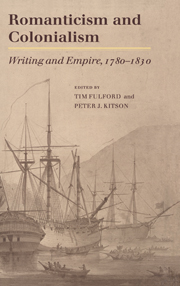Book contents
- Frontmatter
- Contents
- Notes on contributors
- Acknowledgements
- 1 Romanticism and colonialism: texts, contexts, issues
- 2 Romanticism and colonialism: races, places, peoples, 1785–1800
- 3 Romanticism and colonialism: races, places, peoples, 1800–1830
- 4 Accessing India: Orientalism, anti-‘Indianism’ and the rhetoric of Jones and Burke
- 5 ‘Sunshine and Shady Groves’: what Blake's ‘Little Black Boy’ learned from African writers
- 6 Blood Sugar
- 7 ‘Wisely forgetful’: Coleridge and the politics of Pantisocracy
- 8 Darkness visible? Race and representation in Bristol abolitionist poetry, 1770–1810
- 9 Fictional constructions of Liberated Africans: Mary Butt Sherwood
- 10 ‘Wandering through Eblis’; absorption and containment in Romantic exoticism
- 11 The Isle of Devils: The Jamaican journal of M. G. Lewis
- 12 Indian Jugglers: Hazlitt, Romantic Orientalism, and the difference of view
- 13 ‘Some samples of the finest Orientalism’: Byronic Philhellenism and proto-Zionism at the time of the Congress of Vienna
- 14 ‘Once did she hold the gorgeous East in fee…’: Byron's Venice and Oriental Empire
- 15 The plague of imperial desire: Montesquieu, Gibbon, Brougham, and Mary Shelley's The Last Man
- Index
2 - Romanticism and colonialism: races, places, peoples, 1785–1800
Published online by Cambridge University Press: 20 August 2009
- Frontmatter
- Contents
- Notes on contributors
- Acknowledgements
- 1 Romanticism and colonialism: texts, contexts, issues
- 2 Romanticism and colonialism: races, places, peoples, 1785–1800
- 3 Romanticism and colonialism: races, places, peoples, 1800–1830
- 4 Accessing India: Orientalism, anti-‘Indianism’ and the rhetoric of Jones and Burke
- 5 ‘Sunshine and Shady Groves’: what Blake's ‘Little Black Boy’ learned from African writers
- 6 Blood Sugar
- 7 ‘Wisely forgetful’: Coleridge and the politics of Pantisocracy
- 8 Darkness visible? Race and representation in Bristol abolitionist poetry, 1770–1810
- 9 Fictional constructions of Liberated Africans: Mary Butt Sherwood
- 10 ‘Wandering through Eblis’; absorption and containment in Romantic exoticism
- 11 The Isle of Devils: The Jamaican journal of M. G. Lewis
- 12 Indian Jugglers: Hazlitt, Romantic Orientalism, and the difference of view
- 13 ‘Some samples of the finest Orientalism’: Byronic Philhellenism and proto-Zionism at the time of the Congress of Vienna
- 14 ‘Once did she hold the gorgeous East in fee…’: Byron's Venice and Oriental Empire
- 15 The plague of imperial desire: Montesquieu, Gibbon, Brougham, and Mary Shelley's The Last Man
- Index
Summary
In the Romantic period, the processes of colonialism underwent significant transformation, both at the material and ideological level. The rather rigid Marxist distinction between colonialism and imperialism is complicated by the late eighteenth and early nineteenth centuries. The traditional, historical periodization of the Romantic Age as one which coincided with the rise and fall of the old colonial system prior to its supersession by the ‘New Imperialism’ from around 1870 onwards, has been problematized by recent writing. In fact, a new system of British imperialism appears to have been emerging at roughly the same time as what we know as Romanticism began to appear. Gananath Obeyesekere has recently argued that it was in the late eighteenth century that the concept of the ‘colonialist’ changed. Obeyesekere regards the three voyages of Captain James Cook as crucial to this transformation: ‘the voyages that he led heralded a shift in the goals of discovery from conquest, plunder, and imperial appropriation to scientific exploration devoid of any explicit agenda for conquest of and for the exploitation and terrorization of native peoples’. Similarly, Mary Louise Pratt noticed that, around this time, there occurred the end of the ‘last great navigational phase’ of discovery and its replacement by a growing concern with the exploration of the interiors of the continents. This was fuelled by the concomitant emergence of a new ‘planetary consciousness’, altering the ways in which Europeans perceived themselves and understood their place on the planet.
- Type
- Chapter
- Information
- Romanticism and ColonialismWriting and Empire, 1780–1830, pp. 13 - 34Publisher: Cambridge University PressPrint publication year: 1998
- 3
- Cited by

